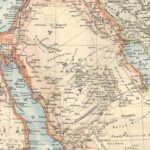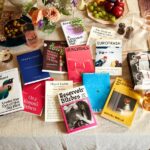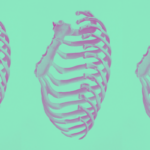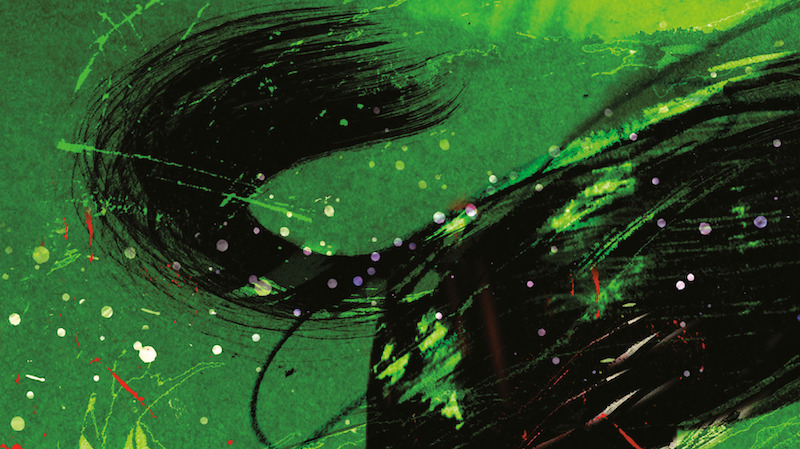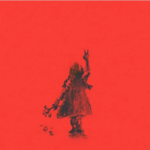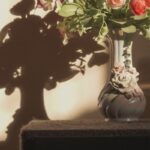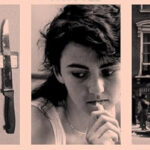The Joy and Terror of Learning to Surf at 49
Mylène Dressler Goes End Over End
I didn’t take my first surfing lesson until I was 49. My friend Maia, who started surfing at age 40, talked me into it. She told me she’d waited too long. She told me she’d spent her summers as a child with her grandparents out in California, digging into the beach, watching the riders dart into the surf; but the old folks never let her get in the water, terrified they’d lose her under its gapped white fence. As a child, she’d closed her eyes and made a promise to herself: one day, she would ride the waves. Then—only a day later, it seemed—Maia woke to find half her life sucked into the rip current behind her.
At 40, she registered for a Santa Cruz surf camp. When she got there, she was the oldest person on the sand. The youngest campers were a dozen girls, nine and ten years old, and the first night, they all crawled into Maia’s tent for comfort. They weren’t afraid of the water. They were afraid of being away from home. The next morning, they all marched into the swells together, the little girls squealing and Maia at ease. Arrived. At last. It turns out that what we are afraid of, at any point in our lives, depends on how far it is from the feeling of being tucked in.
Although I know how to swim and do love the feel of water, I’m also deeply afraid of it. At about the same time that Maia first felt herself drawn toward the Pacific, I lived near it, too, and my grandparents also kept watchful eyes on me. On weekdays, I was driven to their house at the other end of the bay, over suspension bridges, and I stared at the teeter of the Golden Gate in the distance, knowing that people jumped from it. At nap-time, I had terrible dreams of my family’s Buick Skylark breaking through heavy cables and tumbling, hood first, into the water, the waves having changed from little white horses underneath me to one fat black hoof in my face.
Maia asked me if I’d come along on a surf trip with her and some of the students enrolled in the Cape Fear River Basin Project, a course she started a few years ago at our inland college to teach young people about the North Carolina watershed and how we affect it. She told me it would, among other things, be a trip about letting fear go. About daring to look foolish, and not being ashamed to fall over while other people watched. I told her that wouldn’t be a problem for me. My first career was as a ballet dancer. I know what a hard fall feels like. I’ve done a bit of mountain biking, too, and have managed to hit a rock and flip over the front of my handlebars, end over end. I’ve also tried rock climbing and lost my footing and dangled. I fully expected if I tried to surf, I would lurch much more than I’d glide—but I very much wanted to go. At forty-nine, I couldn’t help it. The older I got, it seemed to me, the more I wanted to test the waters. As an impulse, this felt like nothing so much as dumb, primal perversity, the real-world equivalent of a movie character being unable to resist the thrill of a haunted house, or the king’s food taster being unable to resist the urge to apply for his job, expecting the work to be delicious and exciting and, well, with a little luck, nothing more.
Some of my own students had already gone on surfing trips with Maia and told me it would be amazing, I’d have a blast, the water would be butt cold in April, but it would be totally all right: I’d have my wetsuit on and an instructor helping me out. Friends who already knew how to surf dropped gamely to the floors of their offices and living rooms to show me how I’d have to paddle hard hard hard to keep up with the wave and then, without hesitation, jump up and bend my knees, whoosh, like a unicyclist getting her wheel underneath her. A few days before we made the three-hour drive to Carolina Beach, Maia stopped by my office and asked if I was ready and “stoked.” “Sure,” I said. By then, I actually knew what stoked meant. Until that year, I’d always assumed it was just a synonym for excited and vaguely associated the word with wood-burning stoves or maybe steamship engine rooms. But Maia had sent an email around to all of us who were going to surf camp, explaining that stoke was a very specific surfing term and that it referred to a state of excitement, yes, but also hummed with mystical overtones, pointing toward a state of oneness, or of imminent oneness—an understanding that you are, or are about to be, connected to something much larger than yourself. As one philosopher of stoke, Boston College’s Peter Kreeft, has written:
There is a scientific basis for this feeling of becoming one with everything when you become one with the wave. For everything in the universe is in this wave.
Everything conspired to make this wave, everything from the Big Bang through the death of the dinosaurs through last night’s storm. Its parentage, its genetic heritage, is as wide as the universe
. . . The sea horses we ride have run through every field of water on earth. The water we touch in Hawaii has flowed under Arctic and Antarctic icebergs, around Manhattan Island and uninhabited atolls, through California kelp fields and Cape Horn storms. The home address of the water we ride is “Everywhere.”
On the ride toward the Atlantic, nestled in a van between the bodies of people so young and taut their lives could be rolled twice into mine, I was stoked, all right—and shaky. I suddenly realized I wasn’t certain how to prepare myself for this “Everywhere.” It’s one thing to climb a cliff while tied to a nylon rope; it’s another to be a moderate swimmer, with a very old terror of drowning, getting ready to grab a sliver of fiberglass-covered polyurethane foam and throw it into something as deeply uncurious about writers as the sea. A week before the trip, I’d made the mistake of watching the film The Impossible, about the tsunami of 2004, the wave that kept coming and coming and coming—everywhere—curious about nothing, not the universe, not icebergs, not entire villages. I wondered: how many surfers had been out on the Andaman Sea that day? As they’d been sucked backward, seeing land and life and time receding from view, they must have immediately understood what was about to happen, because surfers know waves the way balloonists know wind and IndyCar drivers know walls.
I watched Maia as we piled out at the beach. All of us, students and faculty both, knew that during the first half of the day she’d be handing us over to a group of local instructors, young men who loped between us now, with wetsuits rolled down to tanned, muscled waists—centaurs taking charge of mules. As she’d warned us she would, Maia zipped up her black neoprene suit, picked up her board, and left us without a word, heading straight for the shore. I saw her lean toward the waves. The water at high tide was a thick, candescent blue. The air smelled…erased. I kept my eyes on her, fascinated, as she splattered into the surf and stood there, knee deep; I only half-listened to the Head Centaur’s affable opening lines about how he could surf while standing on his head, because I was too busy watching her reading the scrolls and waiting, waiting (I assumed) for just the right moment: the moment when she could dive in and paddle out past the boiling surf, the division between here and everywhere else. I hadn’t expected the Atlantic, which I’d only visited twice since I’d moved to the East, to be so very rough. It tumbled and crossed on itself, pigeon-toed, chaotic.
At not much more than five feet tall, Maia is tiny, and with her black wetsuit and short gray hair, she looked as slight as a burnt match confronting a hailstorm. All at once I saw her crouch with her board—spying an opening—and shove in.
Now, here’s the trick: to get past the breakers, you have to jump on the board and lie on your stomach and paddle hard hard hard hard hard, and then when a wave comes at you, you have to grab the board by its sides and push your chest up and away from it, arcing like a cobra to muscle yourself up and over the crest, and then keep on going.
“Get it? Got it? Up! Over! Down! Okay! Let’s practice on the sand first!” Our lead instructor shouted at us novices while Maia humped her way over the breakers, and when she reached flat water, I saw her rise and sit up on her board, her legs straddling it, her small head turning this way and that. I could see her eyeing us where we lay flopped on our bellies on the beach, paddling like turtles newly hatched and nudging. I saw her turn away from us, studying the waves. Then back. Her attention, her heart, divided.
During the drive to the coast, some of us had asked her why she wasn’t going to be the one to teach us how to surf. Maia had answered matter-of-factly that her body was way too small and, at 47, way too specific to be a model—adding that what people did in their forties to ride a wave was very different than what younger people did, or should do. I’d opened my mouth, wanting to ask her if that meant I should study her body on the beach and no one else’s. I’d felt keenly how much, how very much, I wanted Maia to teach me to surf. But now, on my stomach on the sand, I closed my mouth and was glad to keep it shut. It wasn’t Maia’s job, after all, to babysit me. It was my job to master this. Besides, there are some things some teachers love too much to teach, and I sensed that, for Maia, riding waves might be one of those things.
I also knew that she hadn’t really brought us to the edge of Cape Fear to teach us how to surf. She’d actually brought us to teach us what it meant to be aware. To be a person among people in a definite place, at a definite time. She’d brought us so that we could try to understand what it meant to be part of a specific moment and place and community. Maia believes that most of us don’t really understand where we are. You are in a place! she will shout at you, passionately, pointing to the windows of the meeting room, the grass underfoot, the water in your bottle. You are not in some bubble! You must not walk around as though you are inside a bubble, unconnected to what’s around you. You must not walk around with earbuds stuffed in your head and your nose plastered to your phone and act as though you’re not touching what’s around you, while it touches you. You need to know where the hell you are. You are here. This is Cape Fear. Where is that? The Cape Fear River is the only river in North Carolina that flows straight into the ocean. Its headwaters are rivers with beautiful names: the Deep, the Haw. Its basin, the land through which its tributaries meander, encompasses more than nine thousand square miles and a wild array of ecosystems, sieving waters from the smallest streams toward a huge coastal estuary. It is home to arguing peoples, waving grasses, fragile animals, one endangered sturgeon, and the Cape Fear Shiner—a fine, amber minnow that lives nowhere else in the world yet at this very moment lingers, languishing, behind dams, unable to swim to where it knows it lives.
All 20 of us on the beach were now ordered to sit up on our boards. We did, crosslegged. We nodded at our instructors, who took turns talking to us for a long time about where exactly we were, and especially about water degradation and upstream contaminants—about how not sharks but cows and pigs, not jellyfish but farmers, not pirates but corporatists are the greatest danger to surf and to surfing in the world. About how some of the most beautiful wave-country on the planet has become so toxic the water can’t even be entered, or else entered only by swimmers fitted with ear and nose plugs to keep the “Everywhere” out, turning their bodies into sealed bottles, the inner no longer touching anything at all.
Maia was still sitting on her board, floating, measuring the waves, and now and again turning to check on us. Later, she would tell me she was anxious. She always is, she said, when she takes people to the edge of the basin. It’s a risk, pulling people from what they know, teaching them that they don’t know anything at all about where they are—not really—and then telling them to take a breath, lie down, start over, crawl.
Suddenly she was down flat. I saw her paddling. Hard, hard. A big wave, swelling, bellying, about to catch up to her. In one motion, she popped up in front of it, gracefully, her small body uncoiling with its white uncoiling while our instructors smiled and nodded and assured us that today’s waves were, really, not that big. But how could that be? I thought. Just look at her, and that wave, and what a wide thing it was, speeding her away from some invisible center.
I was lucky. I got one of the big boards. A long, thick, highly stable one. Practically a raft with a fin. Good.
And I was paired up with a very capable looking blond instructor, too, named Tim. A boy, actually; his torso triangular, like a jib. He was from New York. He’d just moved down to the Carolinas, he told me, because it was warmer here and he could get in the water more. Then he confided to me that this was his very first time teaching anyone, ever. I told him not to worry. When it came to teaching, pretty much every time was the first time.
He explained to me that his job would be, first, to help me get past the breakers and, second, to help me choose and launch into a wave. I shadowed him down the beach. My big board was so heavy I almost dragged it over the sand. I’d peeled my wetsuit up over my shoulders—it was like slipping backward into a tight canal—and I lurched, rubbered and swaddled, toward the shallows. As soon as my bare feet hit the water, I went into shock. It was so cold. And strong. Kicking me around. Shoving me. Wait, wait, I calculated, how long has it been since I’ve even stepped into the sea? It had been years, I realized—years since I’d stuck so much as a toe into an ocean. I couldn’t even remember how long. Still, I nodded to Tim, who helped me steady the huge board fishtailing in my hands, this plastic stranger lashed to me—another shock—something I knew but somehow hadn’t comprehended, not even as he’d shown me how to tighten the Velcro leash-strap at my ankle, tying the board to me, turning me into an island cuffed to an island.
Then it came. The first big swell. I had to get past it. I waited too long. I choked. I didn’t know whether I should go over or under. I tried to go over and—Nnunnhhhh—it knocked me down and deep and numb, and I was under the surface and out of control, in dumb amazement, rolling helplessly, closing my eyes and forgetting to make a protective cage with my elbows around my face the way I was supposed to do. Here was nothing but dark water engulfing me, this everywhere that had always drawn me toward it and yet had also always made me feel small and childish and temporary. My father teaching me to dog paddle in the pool in the backyard of our first house. Passing the test in treading water and holding my breath, preparing for the deep end of the club pool in the better town along the East Bay we moved to next. Dad’s new job taking us to Texas, and my brother and I throwing off our towels and scudding toward the Gulf of Mexico, the brown water so warm and shallow we could walk, amazed, held up by the sandbars, out and out and out, and the waves never lapping above our waists. The summer I thought I might train to swim the English Channel, a swim to conquer finally and forever all fears. I even worked with a coach and breast-stroked across a small lake in Utah to get a feel for open water, but I didn’t like it, feeling how wide the water was, and how deep, and how I didn’t have enough fat on me, no way to say no to the bottom. Tumbling end over end in the darkness of the Carolina surf, the only thing I could think to do was go slack—the way you do when you’ve left your bicycle seat—and try not to panic, no, don’t panic, even though you’re being tumbled end over end. And then it hit me that, really, it wasn’t so much the motion and the depth of the water, no, but the sound of it that was so strange. It wasn’t the current, nor the lack of air, nor of bodily order—or, at least, not only that—but being plunged into a space where there were no words, where words did not matter at all, where they were nothing, and where there was only a hush that was also somehow incredibly loud, and I could no longer be a writer, I was no longer even human, but something more like grass, like grass unrooted, nothing but rootless life, I thought, and oh, I wasn’t even me, I was just life, suspended, and life that didn’t want to be rolled around anymore, so I found which way was up and pushed and shoved and broke the surface and spewed salt and coughed and opened my eyes and felt for and reeled my monstrous board back in toward me along its clear plastic tether, so that I could slide back on and try again.
I didn’t feel embarrassed at all, getting back in place while Tim held the board level for me and watched out for the next cycle of waves. I didn’t feel anything at all, honestly. I just wanted to get back on and get out past the break-line and do what I had come to do. Go where I had meant to go.
At the next swell, I listened to Tim. I paddled like a machine. I ducked under instead of riding over. I held my breath and went down and felt the wave fold like a flag over me. Much better! I came up for air—no time to celebrate—because here was another wave, and this time, I held on to the board and arched my back and rode over it, okay, up, over, down—and only then did I begin to feel something that was not “stoke,” no, not excitement, not any kind of mystical oneness, but something like calm, like method, like sense. Two more crests and I was out past the surf and could really paddle on my stomach, steadily, and feel how deep the water was, billowing underneath me. I chose not to think too closely about that and instead looked around and saw everyone else had already gotten clear, and there we all were, panting and sitting and waiting and floating with our instructors close by. I hadn’t realized that this was what these young men would do: bob around while holding on to nothing, turning themselves into nothing but severed heads out in the open, balancing like dolphins on their tails, while we clung to our boards and turned them around and faced the continent we’d fought so hard to leave.
The feeling, right before we try something new, is like that of being born again. I don’t intend this as some tired metaphor. I mean that there is something vaguely but actually familiar about preparing to come at something untried and unknown, darkness and then light, gasp and then breath, constriction, tensing, then touch. A sensation of pain, maybe, but it’s hard to know, because it’s so very new. Of being tired, even though you’ve done hardly anything at all, yet.
Maia admires a book called The Spell of the Sensuous, by philosopher and ecologist David Abram. Before we set out for the coast, she sent an email around to all of us, attaching this passage, urging us to seek:
a way of thinking that strives for rigor without forfeiting our animal kinship with the world around us . . . attempt[ing] to think in accordance with the senses, to ponder and reflect without severing our sensorial bond with the owls and the wind
. . . “Making sense” must here be understood in its most direct meaning: to make sense is to enliven the senses. A story that makes sense is one that stirs the senses from their slumber, one that opens the eyes and the ears to their real surroundings. . . To make sense is to release the body from the constraints imposed by outworn ways of speaking, and hence to renew and rejuvenate one’s felt awareness of the world. It is to make the senses wake up to where they are.
I floated with my legs straddling my board. The water shrugged all around us. We waited our turns. I watched as, one by one, Maia’s students tried standing up, everywhere.
They looked like birds falling into the nest instead of out of it. Stunned. Frustrated. Swearing. Now and again, a flash of poise, but then the order broke apart as if against a giant slab. Tumblings. Slippings. Shit.
Finally, a lull in the waves, and it was my turn. Tim swam close to me and told me to wait until he said to start paddling, then wait again until he shouted, “Pop up!” which meant it would be time for me to whoosh from my stomach to my feet in one motion. He was going to try to choose a good wave for me, he said, but “Paddle really, really hard, okay?” because in order to catch a wave, you have to be going as fast as the wave itself when it reaches you. Because a wave, like time, doesn’t wait. It’s a train that’s already left the station.
I concentrated on breathing and on keeping my board facing the beach and on listening to Tim. I wasn’t nervous. Or excited. Not at all. I remember only being ready. Is a baby excited before it’s pushed?
I felt Tim push me.
He shouted:
paddle paddle paddle paddle paddle paddle paddle
Pop up!
Toes at a right angle to the front of the board. Now. I’d practiced it on the beach. But instead of standing up, I dropped instinctively to one knee. Like a supplicant. Please! I spread my arms to the side and straightened out my body. I thought I heard someone shouting something at me. But I saw no one. Nothing. Because I was flying.
I saw no tangible thing. I didn’t see the tourists on the beach. I didn’t see the clouds in the sky. I didn’t taste, smell, or fear anything, and I didn’t see anything but the speeding fetlock of the board in front of me, and the wave curling at my shoulders on either side, and I was flying, flying, but without falling, and the wave, the wave was a long cantering thing, and the ocean was a one armed ghost bearing me up, and oh oh oh I was light as a feather, and nothing but sea and sense and sound, and oh, that was me shouting, because I was so wrong, this was nothing like being born, this was like being cut in half, cut down, cut back, down on one knee, half my size and a child still passing some old test in my head, but here, along for the ride, were all the years I had lived, too, and the deep end behind me but also somehow in front of me and still coming on. And the wave, it rushed and flushed and slowly died, and I went down with it, gently at first, then floundering, and then I wheeled and gasped, coughing, and saw others beginning to stand on their boards, some of them so surprised when they did that they jumped off for no good reason, as if something about being in the right place at exactly the right time had spooked them. And I saw others standing taller and for much longer than I had managed to, not on one knee but fully upright, holding their arms wide. Yes yes yes! I shouted, hooping and hollering, already turning and churning to head back out past the breakers again, and Maia, I thought, Maia, you genius, you’re right: the way to get people to think and be a part of the world, of this part of this world, and of each other, is by getting them to be ignorant and trusting, alone and all together, all at once, immersed, and unable to deny it, and then getting them to turn around and grasp and struggle, and see the land and the breakers, and blink and pause and understand, and feel something very particular in the eye, in the duct, in the opening there that is always part of us whether we manage to know it or not: the center, the water. The deep, the haw.
Okay, Maia asked us that night around the campfire, summing up our long, first day, how can we make this last? How can we integrate this experience into our lives? Our thinking? The way we touch and are aware of what is around us? The way we touch and are aware of each other? Where are you now? Be still. Do you know where you are, now?
We’d pitched our tents under the pines and out of sight of the ocean, although we could still hear its traffic in the distance. We were set to take another surfing lesson in the morning and would also inspect the grasses, the bitter Panicum we’d spent all afternoon planting in the dunes, part of our volunteer project for the Cape Fear River Basin, our giving in exchange for our taking. Panicum amarum, also called panic grass, is a local plant essential to holding the dunes in place along the North Carolina coast. It is also a plant that has been decimated by the thoughtless traffic of people.
Our lead instructor had promised us that, when we came back in the morning, he’d show us how he could surf while standing on his head. And I wondered, as the campfire stoked and the wind blew and the trees pulled on their invisible chains, what the water looked like to him, upside down. But then I thought I already knew, because I’d dreamt it, years ago, when I feared tumbling from a suspension bridge. It looked blind. And then I wondered how many of us, young and old around that fire, already knew, in some part of us, that we might often be upside down, panicked, in the years ahead, falling, feeling for something solid, our feet in the air, waiting and listening for that half-buried awareness that says, Where are you, here you are, turn around, other way home.




